Guest Post: The Lesson You Must Learn, is to Rewatch and Yearn
What 'Jumanji' did to my little gay heart
The Yearning Rating: ✰✰✰
Romance: ✰½
Sex:
Storytelling: ✰✰
Performance: ✰✰✰
Yearning: ✰✰
Today’s newsletter is guest-written by friend of The Yearning, and one-third of ARTSLUT, Greg Kozatek! Greg is an art director, designer, and creator / editor in chief of one of your favorite newsletter’s (us <3) favorite newsletters, The InQueery.
Written by Greg Kozatek
When I was eight, the movie adaptation of the children's book Jumanji had an absolute hold on my little gay psyche…but why? I remember seeing the movie with my family on Christmas Day 1995 and having my world turned upside down. There I stood in the parking lot, tears in my eyes, pleading with my mom to let us see it again—the drums of the score still pounding in my chest. I wasn’t granted a second showing, but I did receive the VHS for my birthday and subjected every friend unlucky enough to sleep over at my house to multiple viewings.
In 2023, there’s no point in reviewing the actual plot of Jumanji, but for those who somehow missed this seminal “family film” here’s what you need to know: In 1969, Alan Parrish discovers the board game Jumanji buried in the construction site of his father’s shoe factory (gay). He begins to play the game with his friend Sarah. Lo and behold, the board game is supernatural and has a mind of its own. After rolling the dice, various creatures and perils are released. Alan unfortunately rolls a shit turn and gets (literally) sucked into the game while Sarah is chased out of the house by a swarm of CGI bats. Flash forward 26 years and two orphaned kids, Judy and Peter move into the house with their aunt, Nora, only to inevitably set about a chain of events that has them picking up where the game left off in 1969. By fucking with Jumanji, they free a now-adult Alan from the jungle and unleash an insurance company’s worst nightmare: a menagerie of feral animals, a murderous marksman and an indoor monsoon, all programmed to destroy. Judy, Peter, Alan and an adult Sarah must finish the game to reset their timeline and send the phenomena of Jumanji back to the jungle.
Jumanji is not a gay film by any means, but can’t anything be read as queer with the right lens? In the spirit of this season of reflection, I rewatched Jumanji to see if I could see queerly what my second-grade brain was yearning for. Below are my field notes and obsergaytions:
Historical homoerotic tension
The cold open takes place on a stormy night in 1869, two boys stand in the woods of Brantford, New Hampshire under the pouring rain, attempting to dispose of a trunk that contains the sinister board game. (As a kid I remember wishing they would kiss—no one said they were brothers!). Tom & Huck was released at the same time as Jumanji and I was clearly feeling the dirt clad boy sporting a loose linen shirt vibe. When the younger of the two asks “What if someone digs it up?” the older replies: “God help them!”—a line reading that would make the director of a high school production of The Crucible proud.
Daddy-ish shoes
Young Alan is relentlessly beat up for hanging out with the bully’s girlfriend (they’re just friends!) and is shamed by his father for not manning up—some advice coming from a man who runs a footwear business! In an attempt to achieve paternal acceptance, he lets his bullies give him a black eye and bloody lip. For “taking it like a man”, Mr. Parrish decides to reward Alan by sending him to Cliffside School for Boys, which he also attended. Alan rejects being sent away to the place that made his father into the terrifying bundle of pomade and toxic masculinity before him. Mr. Parrish also makes a snide remark to Alan that, “Even your uncle Skylar went there…”, clearly insinuating that Cliffside is the destiny of every Parrish man (including homos like his brother Sky).
This scene always instilled the fear of God in me—there wasn’t a darker version of Hell than a space designated for men (see also: Boy Scouts, the YMCA locker room, rec basketball). However, as an adult learning the full spectrum of gay antics that go down at boarding schools, I think Alan maybe would have fared better at Cliffside than sewing banana leaves together in the jungles of Jumanji. The Parrish parents leave for an honoree dinner and Alan enacts the very queer plan of running away from home until he is thwarted by…an antique board game. The complicated dynamic of boys seeking approval from their fathers isn’t relegated to the queer experience but damn, somehow acceptance feels gay in a place like this!
Patricia Clarkson’s cameo
Golden Globe winner Patricia Clarkson has about a minute of screen time but knows how to make every second count. She appears at the beginning of the film as Alan’s mother, but is mostly there to serve a glam 1960s lewk. Clarkson deserves an Oscar for the faggy little ta-ta wave she gives her son upon leaving the house (while he’s being berated by his father). An honoree dinner is an honoree dinner after all, and you mustn't be late!
Aunt Nora
Bebe Neuwirth’s turn as Aunt Nora—a single, enterprising woman with a dream of turning a dusty and drop-clothed mansion into a bed and breakfast—immediately achieved icon status. Aunt Nora is too busy bootsing around town securing permits for her parlor bar to be a good caretaker to her charges Judy and Peter. When your passions are real estate flips, a strong lip, booze and berets, you’re going to accrue a gay following. I was so obsessed with the character of Aunt Nora that I would play her at recess (chain smoking for additional effect) and even went so far as to ask Santa for a beret so I could feel the fantasy.
Kirsten Dunst chewing the scenery
Jumanji was one of Dunst’s first major film roles and she really milks the character for all she’s worth. Since Judy’s parents died in a car crash she’s developed a nasty little habit of making up lies as a coping mechanism. 13-year-old Dunst pulls out every trick she’s got; accents, crocodile tears and melodramatic monologues to make sure future casting directors took note, and thank God! Every time a telemarketer called my home growing up, I would employ Judy’s British-read: “Sorry dear, I think you have the wrong number.” Thanks Kirsten!
Robin Williams
Robin Williams’ attention-grabbing flamboyance can not be denied. Because he was generally respected by my straight peers for being a comic genius, I felt safe in declaring him an “interest” over the more classic choice of Adam Sandler.
Alan’s jungle costume
This outfit looks like the outcome of A RPDR drag on a dime challenge sponsored by Michael’s. A horseshoe crab helmet? If you can’t find one in the jungle, store-bought is fine.
Queernivorous plant
Out of the many puppets in the film, the pod plant and her baby barb shooting blossoms serve the most cunt. This plant looks like, well, a puckered butthole with thorny petals. It shoots out a vine from its orifice, ensnaring Peter. Alan quickly hacks the vine in half with a handy cutlass. I knew this diva was for me when I found myself rooting for her instead of the humans.
Monkey see
Among Jumanji’s escapees are a troop of monkeys with a penchant for throwing knives and wielding firearms. While wreaking havoc on the town of Brantford, they happen upon an electronics store where an old TV is playing the flying monkey scene from The Wizard of Oz. The monkeys see their violent lived experience reflected in the beloved queer classic and begin to jump up and down, pretending they can fly. Representation matters!
The old Parrish place
It would come as a real shock to learn that this set piece didn’t come from the imagination of a queer production designer (the Baz Luhrmann of it all!). The house boasts a magnificent grand staircase with a sensual sweeping curve, a library flaunting oak details and, of course, a fireplace with a brass peacock screen. This house really gets its ass handed to it throughout the course of the film but, no matter what destruction befalls it, still manages to look Architectural Digest ready. I remember audibly gay-gasping when Robin Williams busts open the doors in the third act of the film to find the flora of Jumanji have given the mansion a full makeover. This prompted a years-long campaign of me begging my parents to take me to the nearest Rainforest Cafe in Burlington, Massachusetts—just so I could get the faintest taste of what it must have been like to be “on set”.
Ruining Christmas
Perhaps this film’s queerest act was creating a depiction of Christmas so gay and so grand that no actual Christmas could ever live up to it. Jumanji’s final scene is set in the future, after Alan wins the game and all of the events of the film are reversed (oop, spoiler!). Alan and Sarah are throwing a Christmas rager in their home decked out with giant wreaths, luminaries and a 30-foot-tall tree trimmed for the gods! The house is packed with guests caroling in festive attire around a piano while sparkling brooches adorn every crushed velvet blazer; everyone is positively aglow with holiday spirit. While I may never attend a Parrish family level holiday bash, I think Jumanji can join my pantheon of films featuring Christmas + supernatural chaos, alongside The Mothman Prophecies and Gremlins.
The filmmakers couldn't let Jumanji end with a holiday miracle. The baby queer in me squealed with delight when a final button of the cursed board game washed up on the beaches of Bordeaux (at least in my mind). A pair of beach-combing girls are seen sauntering in the sand, while the drums of Jumanji roll once again. One of the girls remarks to her friend, “Quel est ce bruit?” If ending a family film with ill-fated jeunes filles isn’t gay, I don’t know what is.



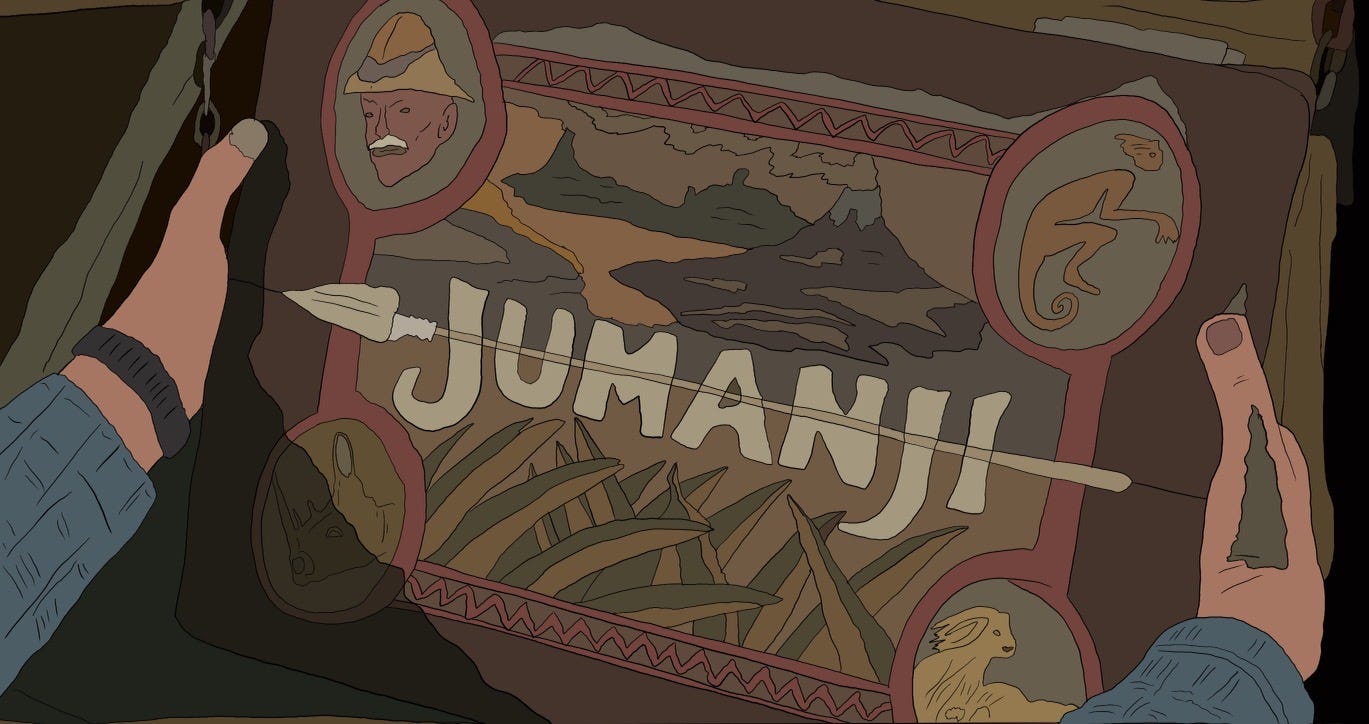




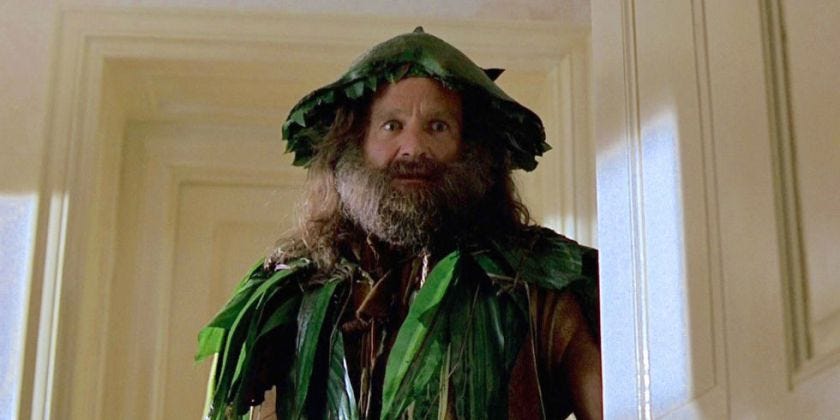
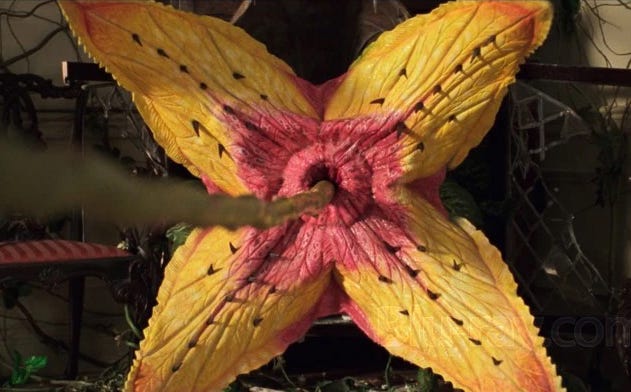
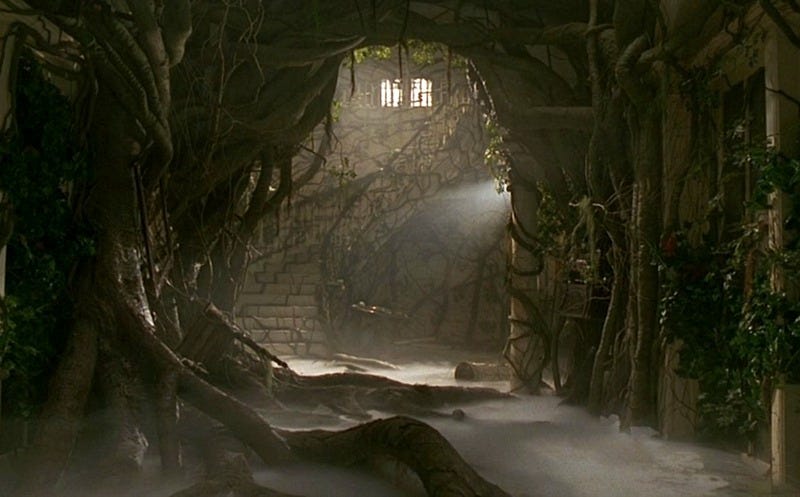
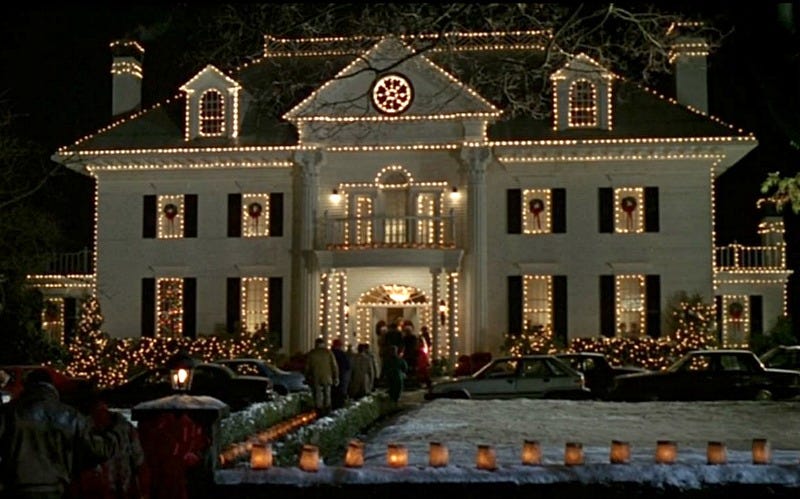
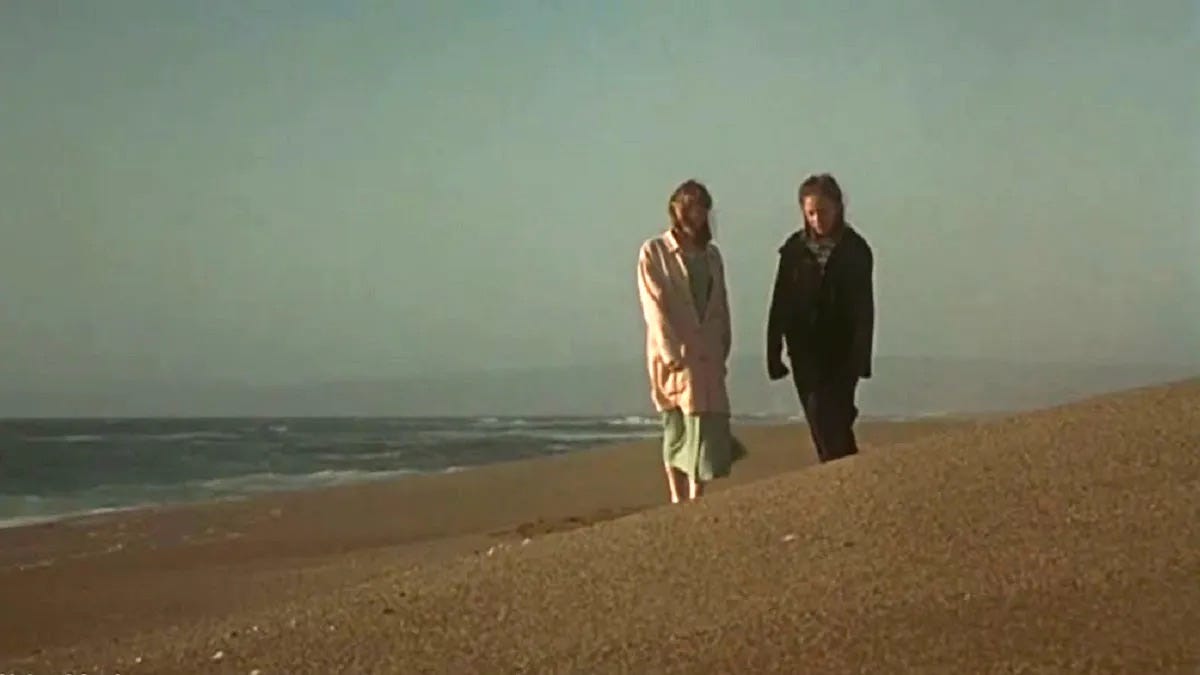

"a line reading that would make the director of a high school production of The Crucible proud." 😂